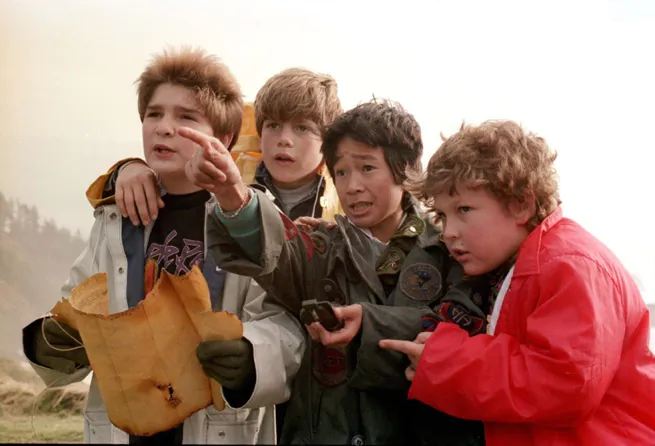The Success Principles of Poker: Ask The Goonies

-
T&Cs Apply | Play Responsibly | GambleAware
18+ | Play Responsibly | T&C Apply
-
T&Cs Apply | Play Responsibly | GambleAware
+18 / T & C apply / Play responsible

- Fact Checked by: PokerListings
- Last updated on: July 23, 2025 · 5 minutes to read
Table of Contents
I want to be a multi-millionaire.
I’m not interested in yachts, supercars and fine dining. I want to be able to make a difference in the world.
I want to enrich the lives of people who need it the most. Right now, money seems to be the best way to do this.
It’s a great goal, right? There’s only one problem. I don’t know how to do it.

Talal Shakerchi Looked Like a Science Teacher
A few years ago I was standing in the queue in Starbucks. I was in the Rio in Las Vegas.
The World Series of Poker (WSOP) was in full swing. I was people watching. I spied a middle-aged man sat by his lonesome. He looked like a science teacher.
Where have I seen you before?
Then it clicked. It was Talal Shakerchi. He had played in the €100,000 Super High Roller at the European Poker Tour (EPT) in Monte Carlo.
I had covered the event. A colleague told me he was a high-stakes cash game player from London. I did some research.
It turns out that he wasn’t a high-stakes cash game player. He was one of the most successful hedge fund managers in the world.
The Times’ Rich List estimated his wealth to be in excess of £100 million and he was one of the Top 20 Philanthropists in the UK.
“Chai tea latte please.”
I walked over to Talal’s table and asked him if I could take a seat. He gestured for me to sit down. I introduced myself and asked if I could interview him.
“What do you want to interview me for?” he asked, genuinely puzzled.
“I don’t know … perhaps because you have just paid $1m of your own money to play in the One Drop,” I thought.
“The poker community would be interested in learning more about you,” I said.
Choose a Different Perspective
From that moment on a friendship blossomed. I have dinner with Talal on a regular basis. I don’t think our meeting happened by chance.
Weeks prior to this I had created a set of affirmations and visualizations that asked the universe to send me a person who could show me the way. Was this the guy?
We live in a time of achievement. We see war. We see poverty. We see pain. Choose a different perspective. See peace. See abundance. See pleasure. See the technological age and the speed at which we are advancing as a civilization.
Unless you want to set foot on Mars, survive a swim in lava or dive to the depths of the Mariana Trench you will find that someone else has done mostly everything that you want to do in life.
I love the movie The Goonies. My friends used to think that I actually had a role in it. They used to call me Data because I am half-caste Chinese.
“Pinchers of peril! Pinchers of peril!”
One day the kids find a treasure map. They follow it. There are some traps and pitfalls along the way. There are some clues.
There are some people determined to stop them from getting to the spot marked ‘X’. They got there though.
Ask The Goonies
If you want to find the cove that once contained the treasure – ask The Goonies.
What are you searching for? Do you want to be the greatest poker player the world has ever seen? Or do you have dreams that make poker seem almost trivial?
Whatever it is that you want to do, find someone who has done it before you and then learn from him or her.
This can be directly or indirectly. Some of them will give you clues. Some of them will hand you the map.
Some of them will grab your hand and walk side-by-side every step of the way.
There are many ways you can do this. You can read books that they have written. You can watch the way they move.
You can listen to recordings they’ve made. You can join their online training courses.
You can reach out to them through social media, e-mail, telephone … or just walk up to them in Starbucks and ask to take a seat.
The Status Quo is Warm and Comfortable
Here are a few critical reasons that people don’t seek out the help of others who have already made it in the field they want to make it in.
1. Ego
You don’t want to be rejected. You’re worried if you ask for their time and they rebuff you that your ego will be dented – you are not worthy.
2. Thought
You don’t even think of it. They are so far out of your reach it never occurs to you to seek help and advice. They are not in your sphere of influence. Therefore you don’t even think to ask.
3. Hard Work
It’s hard work to seek out these people and apply the right form of persistence. It’s much easier to hold back and not reach out. The status quo is a nice, warm and comfortable place.
We are all flesh and blood – even the most successful amongst us. We are all driven by the same needs and desires.
Think of a person who you would love to learn from. Now consider this. That person has a desire to grow. Part of this growth comes through talking to people like you.
There will also be a strong desire to contribute. By helping you they are achieving this. It also creates significance for them; variety, certainty, and when you thank them there will be love and connection.
These are the six human needs. We all have them; they power every one of us. Get looking for the clues that these people have left behind. Find your treasure.
Ask Great Questions
Here is some advice on how best to do that:
- Create a list of all the people you would like to learn from.
- Write down all the different ways you can learn from these people.
- Select one that you believe you could have the most influence over.
- Start asking the universe for the meeting to take place through affirmations and visualizations.
- Create a plan to get into contact with this person. How will you behave? What will your leverage be? How will you grab their interest? What value can you give them? How will the initial contact be managed?
- When you have their attention – listen.
- Don’t talk about yourself – how can you learn this way?
- The strength of your learning depends on the strength of your questions. Always ask great questions and you will receive great answers.
- Create a methodology for follow up.
- Give them space.
FAQ
What are success principles in poker?
Success principles in poker are guiding ideas and practices that help players achieve their goals at the tables. These can include seeking mentorship, maintaining discipline, handling emotional swings, and continuously studying both theoretical models and practical tactics to stay ahead of the competition.
How did Talal Shakerchi illustrate the value of unexpected mentorship?
He appeared as an unassuming science teacher yet turned out to be a highly successful hedge-fund manager and philanthropist. His example shows that valuable mentors may not always look the part, and you never know who could help you discover new ways to achieve your ambitions.
Why do people hesitate to reach out for help or guidance in poker?
They often let ego, limited thinking, or fear of rejection hold them back. These barriers keep them from asking for assistance, even when learning from more experienced players might be the key to faster and more meaningful progress.
How can someone effectively learn from elite poker players without direct contact?
They can read books or articles written by these pros, watch training videos, use online study tools, and follow expert streams. Even without one-on-one communication, consistently absorbing high-level content can sharpen your own strategy and mindset.
How does data analysis improve high-level poker performance?
By recording and reviewing key hands, you can spot patterns, study your own tendencies, and better exploit those of your opponents. This reflective approach helps you turn theoretical knowledge into concrete strategic improvements for long-term success.
When is adapting away from GTO profitable in professional poker?
If you identify clear tendencies in an opponent’s game—like frequent folding to c-bets, or an unusual bet-sizing pattern—you can deviate from a pure GTO approach to exploit those tendencies. The trick is to maintain a balance so that you don’t become predictable yourself.
What is the best way to approach a poker mentor or coach for advice?
Show genuine curiosity and a willingness to learn. Be respectful of their time by asking concise, thoughtful questions. Offer something of value in return, if possible, such as interesting hand histories or insights into a new game format. The key is to listen more than you speak and keep the conversation focused on your goal of learning.
-
- 100% up to $2000
T&Cs Apply | Play Responsibly | GambleAware
18+ | Play Responsibly | T&C Apply
-
CoinPoker4.1
- 33% Weekly
- 150% up to 2000$
T&Cs Apply | Play Responsibly | GambleAware
+18 / T & C apply / Play responsible
-
Stake.US Poker4.3
- Rakeback 5%
- $55 Stake Cash + 260K Gold Coins
T&Cs Apply | Play Responsibly | GambleAware
18+ | Play Responsibly | T&C Apply
-
- 100% up to $1000
T&Cs Apply | Play Responsibly | GambleAware
T&Cs Apply | Play Responsibly | GambleAware
-
T&Cs Apply | Play Responsibly | GambleAware
18+ | T&Cs Apply | Play Responsibly | GambleAware




User Comments
It’s not a poker strategy.
Don’t know how much I buy this for poker strategy but love the Goonies.